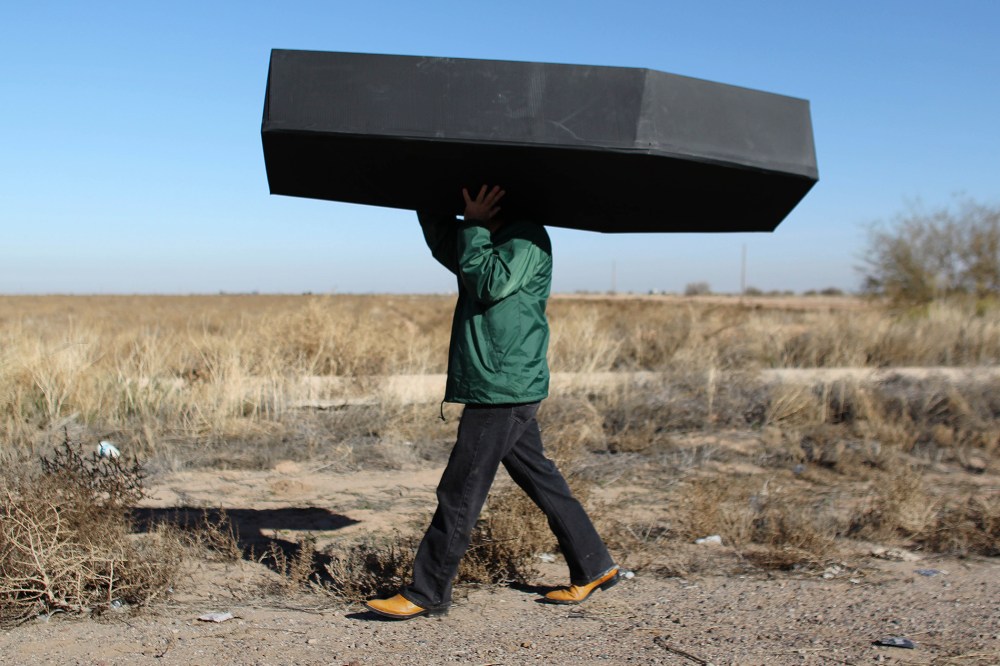Arizona earned a reputation as a laboratory to experiment with some of the country’s most extreme anti-immigrant laws imagined long before Republican presidential front-runner Donald Trump entered the scene. The candidate simply re-packaged old ideas and made them mainstream.
The state already has a version of Trump’s “big, beautiful wall” proposal along its border, with hundreds of miles of fencing dividing most of its shared boundary with Mexico. A statewide crackdown on illegal immigration once deputized local cops to double as immigration agents. Arizona officials and voters in the past gave their blessing to official policies to weed out undocumented immigrants and push the boundaries of what defines racial profiling.
RELATED: Pope suggests Trump ‘not Christian,’ but others back Mexico wall
In many ways, the state is a decade ahead of the rest of the country when it comes to ramping up immigration enforcement — and dealing with the often disastrous results. But Trump heads into Arizona’s primary Tuesday with a clear lead in one of the few regions in the country that shares his penchant for controversy in the name of cracking down on illegal immigration.
“We’re ground zero for this racist, nativist mischief-making,” said Alison Harrington, pastor at the Southside Presbyterian Church in Tucson and a leader in the immigrant rights movement. “This existed before Trump. We get into dangerous water when we say that it’s all just one person’s fault.”
For years, Arizona cranked out new, almost inventive laws designed to either criminalize immigration or make life so inhospitable for those who are undocumented that they were left no choice but to “self-deport.”
The most notorious of these measures was SB 1070, a law that required undocumented immigrants to register with the state and carry “alien-registration papers” at all times. Local law enforcement had permission for warrantless arrests if officers felt they had probable cause that an offense could result in deportation. The law also made it a crime for undocumented immigrants to even solicit or apply for work.
Another voter referendum, known as Prop 100, denied bail to undocumented immigrants in an exceptionally broad definition of what constituted a “serious” crime.
The height of anti-immigrant sentiment is what gave Sheriff Joe Arpaio of Maricopa County a platform to become a prominent national figure with continued relevance today as a key surrogate for Trump’s presidential candidacy.

Starting around 2005, Arpaio became notorious for carrying out immigration raids that targeted primarily Latino-heavy neighborhoods and businesses known to employ immigrant day laborers. He tasked squads to carry out traffic stops on Latino drivers to inquire about their immigration status. Some were detained for extended periods to allow federal immigration agents time to intervene.
Arizona’s legislative moves to combat immigration inspired copycat bills around the country. But despite all of this action, there’s one key takeaway from Arizona’s anti-immigrant zeal: federal courts have since either blocked large portions of these laws and practices, or found them entirely unconstitutional.
“Of all states, Arizona should know better than to go down this anti-immigrant road,” said Cecillia Wang, director of the ACLU Immigrants’ Rights Project. “Their experiments in immigration enforcement completely failed and resulted in nothing but litigation and boycotts.”
Federal courts swiftly stepped in and put SB 1070 on hold. The case eventually made its way to the Supreme Court, which in 2012 upheld every injunction except for one key provision: allowing police officers to check a person’s immigration status when investigating possible crimes.
Other anti-immigrant practices soon crumbled. The 9th Circuit Court of Appeals found the voter referendum, Prop 100, unconstitutional in 2014. Meanwhile, Arpaio has been hit with a barrage of federal lawsuits, the latest over allegations of racial profiling by the Maricopa County Sheriff’s Office. He is currently tied up in a spin-off civil suit determining whether he should be held in contempt of court.
The blowback was so strong that six years since SB 1070 law was first enacted, both sides remain bruised from the battle that ensued.
The laws cost taxpayers millions of dollars to litigate, but almost nothing compares to the economic damage when pro-immigrant allies banded together to fight back.

Groups from across the country launched a statewide boycott to exert immigrants’ political power through their purse strings. Allies in the movement were encouraged to boycott travel and commerce.











